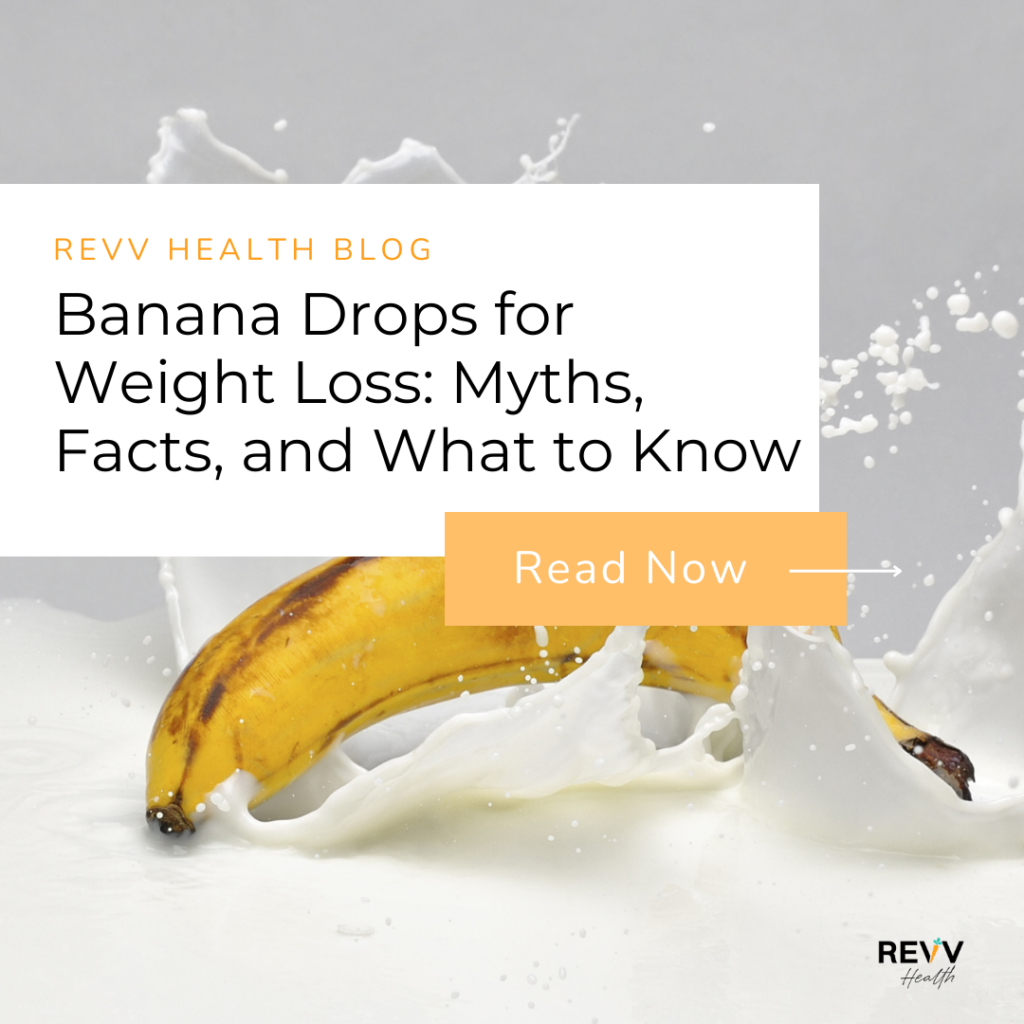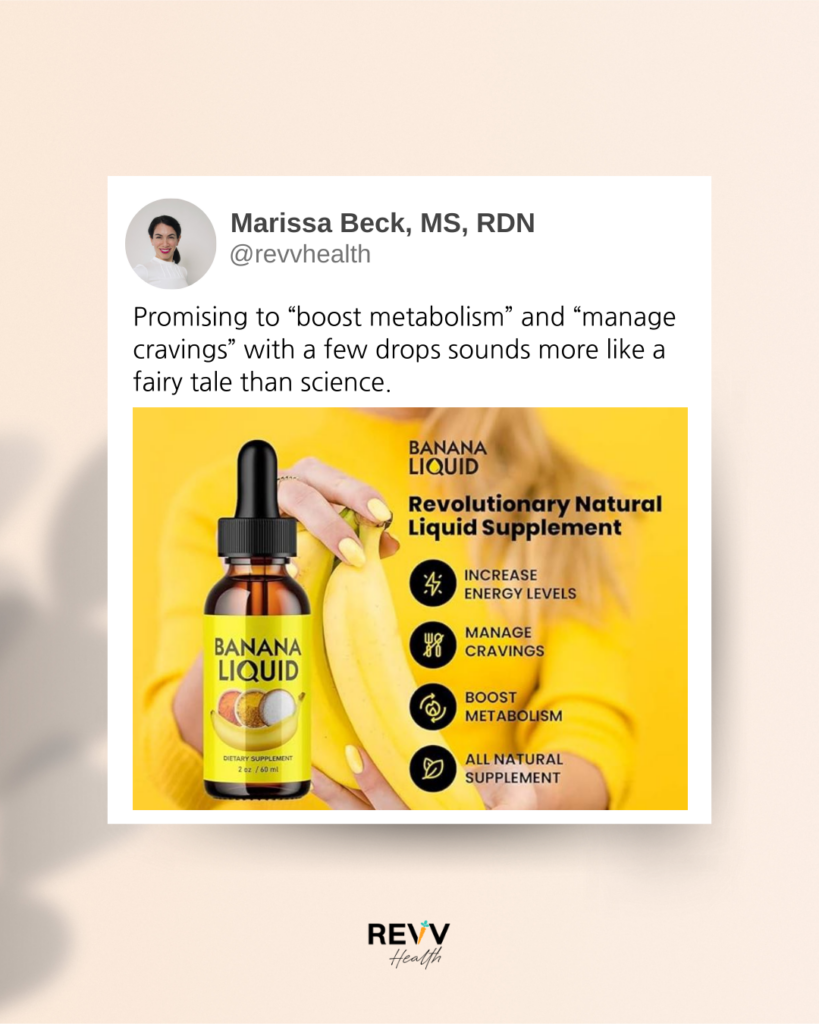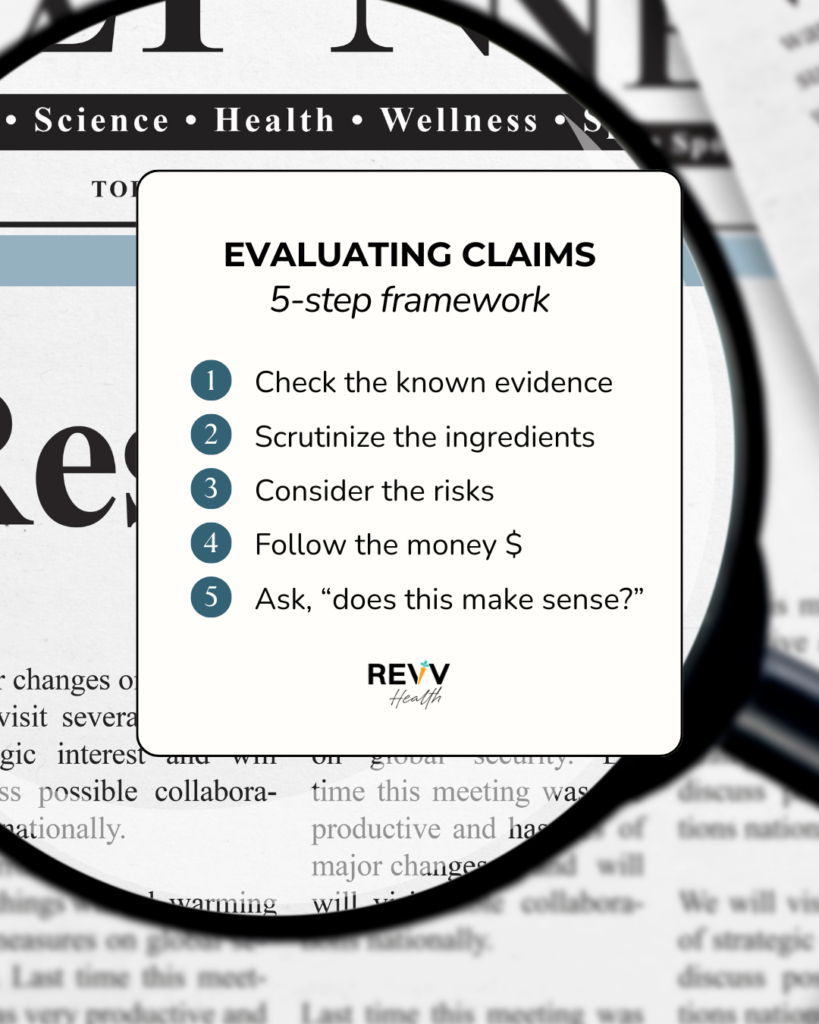The first time I heard about banana drops for weight loss, I genuinely thought it was satire. But then, I quickly reminded myself we are living in a time where many headlines that sound like parodies end up turning out to be real.
If you don’t know me (yet), let’s get something straight from the start: I’m Marissa, a non-diet registered dietitian nutritionist (RDN), and I spend my days studying the science of nutrition and helping my clients improve their health and relationship with food, without gimmicks or quick fixes.
So, why on earth am I writing about banana drops for weight loss? Because many of my clients come to me with questions about trends they’ve heard on social media or in the news, and my goal is to provide accurate, evidence-based information to help them cut through the noise. Your result? You can make informed decisions.
By the time you finish reading this, you’ll not only understand the evidence behind banana drops, but you’ll also have a 5-step framework for evaluating other weight loss claims that seem just as far-fetched. We’ll also break down the science (or lack thereof), consider any potential risks, and explore whether there’s anything of value hidden behind the hype.
Disclaimer: Please note I will not be sharing links to Banana Drops or similar products in this article. My goal is to provide evidence-based information, not to inadvertently boost their marketing or visibility.
What are banana drops?
Banana Drops are a liquid supplement marketed as “a natural weight-loss aid.”
Despite the name, they don’t actually contain bananas or banana-derived ingredients (why am I not surprised?). Instead, they’re a mix of plant extracts, stimulants, and flavoring agents, labeled as “all natural.”
The idea is that you take a few drops under your tongue or mix them into a drink. The manufacturers claim this method helps the body absorb the ingredients faster.
While the specific ingredient list can vary by brand, many Banana Drops include components like green tea extract, guarana (a caffeine source), raspberry ketones, and capsicum (chili pepper extract).
As with most weight-loss supplements, the questions are if they actually work and if they’re safe…not just trusting their claims.
So let’s find out!
The claim: how are banana drops supposed to help with weight loss?
According to product descriptions, banana drops are designed to “boost metabolism,” “suppress appetite,” and “enhance fat burning.”
The companies promise that their “proprietary blend” of ingredients will help with certain benefits, such as “increasing calorie burn, reducing sugar cravings, or managing stress.”
On the surface, it all sounds simple and enticing. But as with most supplements, the real question is whether these claims hold up when examined through a scientific lens.
What does the science say about banana drops for weight loss?
If only companies like these invested as much in rigorous research as they do in flashy marketing.
The promises, i.e., “boosting metabolism, suppressing appetite, and burning fat,” all sound enticing, but do they hold up?
And even if there were some benefits to the ingredients, are you even getting enough in each drop to make a difference?
Here’s what I mean.
Take green tea, for example. Its high catechin content, particularly EGCG (epigallocatechin-3-gallate), is linked to numerous health benefits, including supporting cardiovascular health, aiding glucose metabolism, and providing potent antioxidant effects (Source).
But how much of those active compounds can realistically fit into a few drops of liquid? And would such a tiny dose be enough to deliver those benefits effectively?
It’s like being offered a drink with a teaspoon of coffee in it. Sure, it technically contains caffeine, but it’s not enough to wake you up, let alone power your day.
This is the issue with products like Banana Drops. Even if the ingredients might have some modest evidence behind them, the doses are often too small to have any real impact.
But, let’s take a closer look at the ingredients in Banana Drops and what the evidence actually says.
- Green Tea: contains caffeine and catechins like EGCG, which may slightly affect metabolic rate, but the effects are modest and temporary (source).
- Guarana: high in caffeine, it can increase energy and metabolism short-term, but may cause jitters or other side effects. Long-term weight loss impact is minimal (source).
- Raspberry Ketones: shown to affect fat metabolism in animal studies, but evidence in humans is weak. Effective doses in supplements are unrealistic (source).
- Gymnema Leaf: may reduce sugar cravings and block sugar absorption. Helpful for blood sugar management, but its weight loss effects are minimal (source).
- Capsicum Annuum (Chili Pepper): capsaicin can slightly increase calorie burning, but the effects are small and unlikely to result in significant weight loss (source).
- GABA (Gamma-Aminobutyric Acid): known for reducing stress, but little evidence supports its role in weight loss. Its main benefit may be stress management (source).
- Chromium: may help regulate blood sugar and reduce carb cravings, but its impact on weight loss is inconsistent and generally minor (source).
- Monoammonium Glycyrrhizinate: derived from licorice root, it may reduce inflammation, but high doses can cause side effects like high blood pressure. Weight loss evidence is unclear (source).
- Gotu Kola (Centella Asiatica): traditionally used for circulation and swelling, but there is minimal evidence of weight loss benefits. Most research focuses on healing and cognition (source).
- Grape Seed Extract: may support weight loss when combined with a calorie-restricted diet by reducing inflammation and appetite, but it won’t work alone (source).
- Horse Chestnut: supports vascular health and reduces swelling, but there’s no evidence it impacts weight loss or fat metabolism (source).
- Hawthorn Root: known for heart health benefits, but Tejocote, a hawthorn-derived product, has been linked to serious side effects like liver damage. Weight loss evidence is limited (source).
- Stone Root: used traditionally to support vascular health and reduce fluid retention, but scientific evidence for the effect of weight loss is lacking (source).
- Motherwort: may reduce stress and support heart health, but there is no direct evidence linking it to weight loss (source).
As you can see, while some of the ingredients have been studied for their health benefits, the evidence supporting their role in weight loss is shaky, at best.
For example, most of these compounds (like green tea or capsaicin) might support metabolism, but the effects are modest and highly dependent on the dose.
At the end of the day, these drops make bold promises, but the science behind them is underwhelming.
What about the role of third-party reviews in supplement safety?
One of the biggest concerns with products like Banana Drops is the lack of third-party oversight.
A third-party review involves an independent organization evaluating a supplement to verify its claims, check for contaminants, and ensure it meets certain safety standards.
Third-party organizations like NSF International (National Sanitation Foundation) or USP (United States Pharmacopeia) conduct these reviews, which can give consumers more confidence in a product. These organizations test for purity, quality, and ingredient accuracy, offering an added layer of trust.
However, even when a supplement carries certifications from reputable third-party organizations like NSF or USP, it doesn’t mean the product is 100% safe or effective.
These reviews focus on verifying what’s in the product and ensuring it’s free from harmful contaminants, but they don’t guarantee the supplement will deliver on all its claims or that it’s right for everyone.
When it comes to weight-loss supplements, the absence of third-party review raises serious red flags, but even the presence of certification isn’t a free pass.
That’s why we have to consider the science behind the ingredients, potential side effects, and whether the supplement aligns with your health needs.
Why quick-fix weight loss products often fail
Weight loss supplements, like Banana Drops, often appeal to our desire for a simple, effortless solution to a complex issue.
But as I often remind my clients (and now I’m reminding you), sustainable weight management, meaningful behavior changes, and a healthy relationship with food can’t be found in a bottle.
Products like banana drops for weight loss are using the classic car salesman trick:
- Overhyped claims: promises like “boost metabolism” lack strong scientific evidence. Similarly, just as we can’t “boost immunity,” metabolism is also a complex system.
- No behavior change: they don’t address eating habits, activity, or stress management.
- Risky ingredients: stimulants and unregulated herbs can cause serious side effects. (unregulated, meaning no independent, third-party evaluation to verify safety or effectiveness).
- Placebo effect: initial results often come from lifestyle changes, not the product itself.
- Short-term fixes: results, if any, disappear once you stop using the product.
Quick fixes fail because they oversimplify something that’s much more complicated, nuanced, and deeply personal.
The risks and side effects of banana drops
Just because Banana Drops (or any supplement for that matter) is marketed as “natural” does not automatically mean it is safe.
Here are some concerns to consider:
- Unregulated ingredients: many weight-loss supplements lack proper oversight, leaving consumers unsure of what they’re actually ingesting.
- Potential side effects: ingredients like guarana and licorice-derived compounds can cause jitters, high blood pressure, or gastrointestinal issues.
- Allergic reactions: herbal blends increase the risk of allergies, especially for those sensitive to certain plant-based ingredients.
- Serious health risks: hawthorn-derived products like Tejocote have been linked to liver damage and gastrointestinal distress.
- Interactions with medications: some ingredients may interfere with medications, especially those for blood pressure, heart conditions, or diabetes.
It goes without saying to approach all supplements with caution, especially when their safety and efficacy haven’t been thoroughly studied or regulated, as is the case with Banana Drops.
How to evaluate weight loss claims: a 5-step framework
When you come across products that sound too good to be true (like Banana Drops for weight loss), here’s my 5-step framework to help you decide if it’s worth trying:
- Check the known evidence: look for scientific studies, not just testimonials. Are the claims backed by reliable research? If the product relies on buzzwords without citing peer-reviewed studies, that’s a red flag.
- Scrutinize the ingredients: are ingredients backed by evidence for the specific claims? If the ingredient list is vague or missing entirely, proceed with caution.
- Consider the risks: are there any potential side effects or safety concerns? Unregulated supplements often come with hidden risks.
- Follow the money: who’s promoting this product? If the claims come from influencers, marketers, or companies with something to sell, approach them with skepticism.
- Ask, “Does this make sense?”: in the case of banana drops, no. Weight loss isn’t magic; it’s a combination of habits, behavior, and biology. If the product promises effortless results or shortcuts, it’s likely too good to be true.
My 5-step framework won’t just help you spot the red flags in weight loss products; it’ll empower you to make better, more informed decisions about your health overall.
A non-diet dietitian’s perspective on weight management
I get it. It is completely valid that you want to feel better, have more energy, or even lose weight.
What I’m about to say might sound counter to your weight goal, but focusing on your weight as the sole marker of health often doesn’t result in weight changes, leading to frustration and an endless cycle of starting and stopping dieting.
Here’s why: when weight becomes the only thing you’re chasing, it’s easy to get caught up in restrictive diets, quick-fix solutions, and products that promise the world but deliver little more than disappointment (and sometimes nasty side effects).
And when those methods don’t work, then you’re left feeling like you’re the one who’s the failure instead of realizing the issue was how you’re measuring success to begin with, not you.
What I want for you and what I help my clients work toward is a very different way to think about health and weight.
Instead of focusing solely on the scale, we look at things like:
- How are you feeling physically and mentally?
- Are you eating in a way that satisfies you and keeps you energized?
- Does movement fit into your life in a way that feels good, not like a punishment?
These things might not sound fun and exciting, but they’re the foundation for feeling better in your body. And this isn’t just for a month or two, but long-term.
Takeaways: are banana drops worth trying?
Nope. This $hit is bananas. B-A-N-A-N-A-S. Thanks, Gwen Stefani 🙂
You also do not need restrictive meal plans or the next big trendy supplement or diet.
Health and nutrition goals amount more to what behaviors you do consistently versus what you buy into.
If weight management is part of your goal, the best way to approach it isn’t by obsessing over a number on the scale or getting a new supplement but by being kind to yourself and building healthier habits that actually fit your life (and don’t make you miserable in the process).
If you’re tired of the endless cycle of trying and failing, maybe it’s time to take a step back and ask a few questions:
- Do you look forward to your meals?
- Do you feel like your food choices are nourishing your body?
- Are you eating in a way that feels sustainable and fulfilling?
Banana Drops? Not it.
Focusing on what works
We’ve explored what Banana Drops are, the bold claims, the science (or lack thereof) behind the ingredients, and why quick fixes like these often fall short.
As with many trendy supplements, the marketing overshadows the evidence. In fact, much of the research shared here has even questioned the legitimacy of products like Banana Drops for weight loss, with concerns about the lack of transparency and the possibility of misleading claims.
If there’s one takeaway from all of this, it’s that taking care of your health does not come from magical drops. But it does come from consistent healthy habits, self-compassion, and evidence-based strategies that actually work.
So, here’s what I want you to do next.
If you’re done with quick fixes and want to focus on what actually works, I’ve got something to help you get started.
In this free video, I’ll walk you through:
- How to apply my simple 5-step framework to evaluate weight-loss claims
- Practical tips for spotting red flags and separating fact from fiction
- How to focus on small, meaningful changes that actually support your health
Click below to watch and start making more informed, confident choices about your health today.





0 Comments